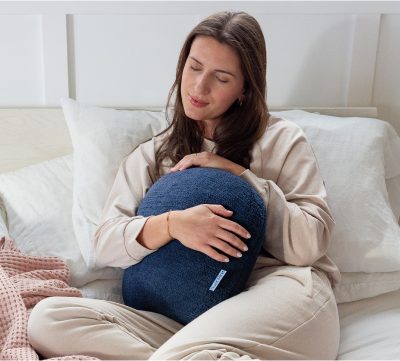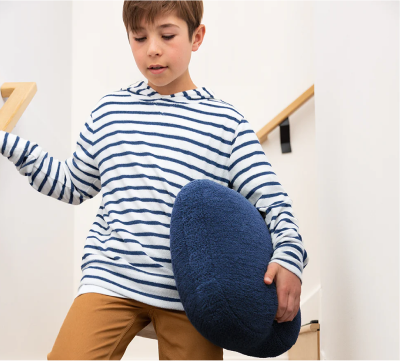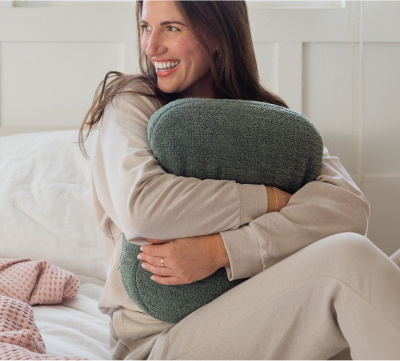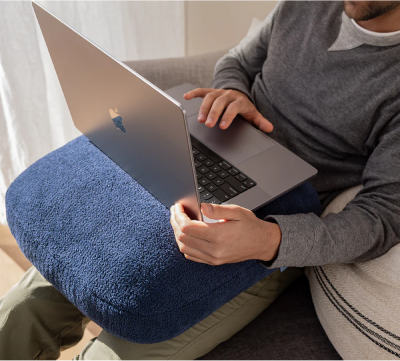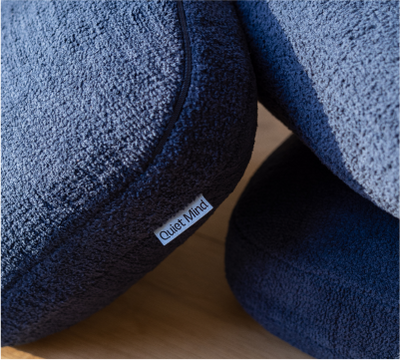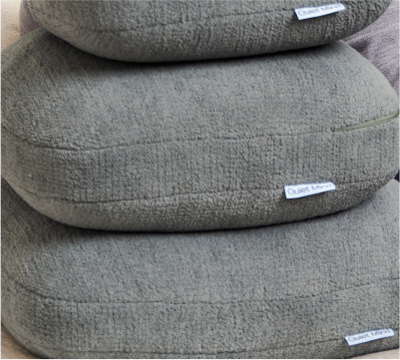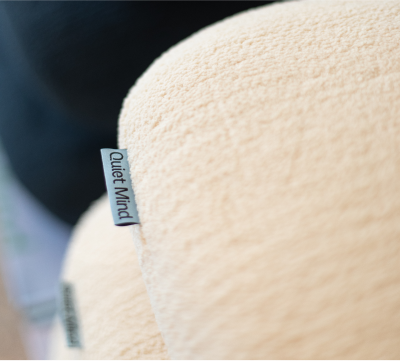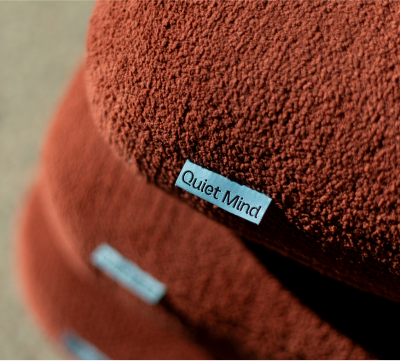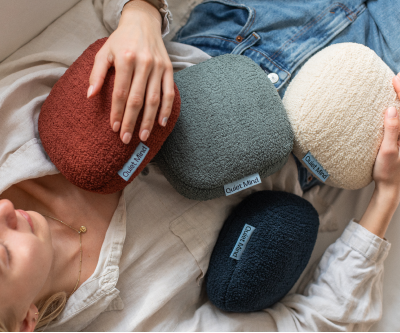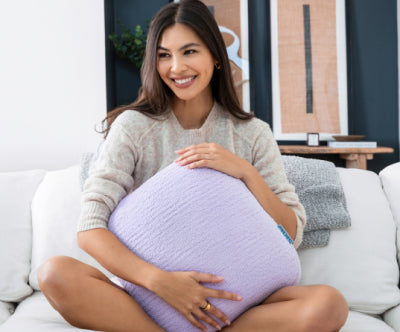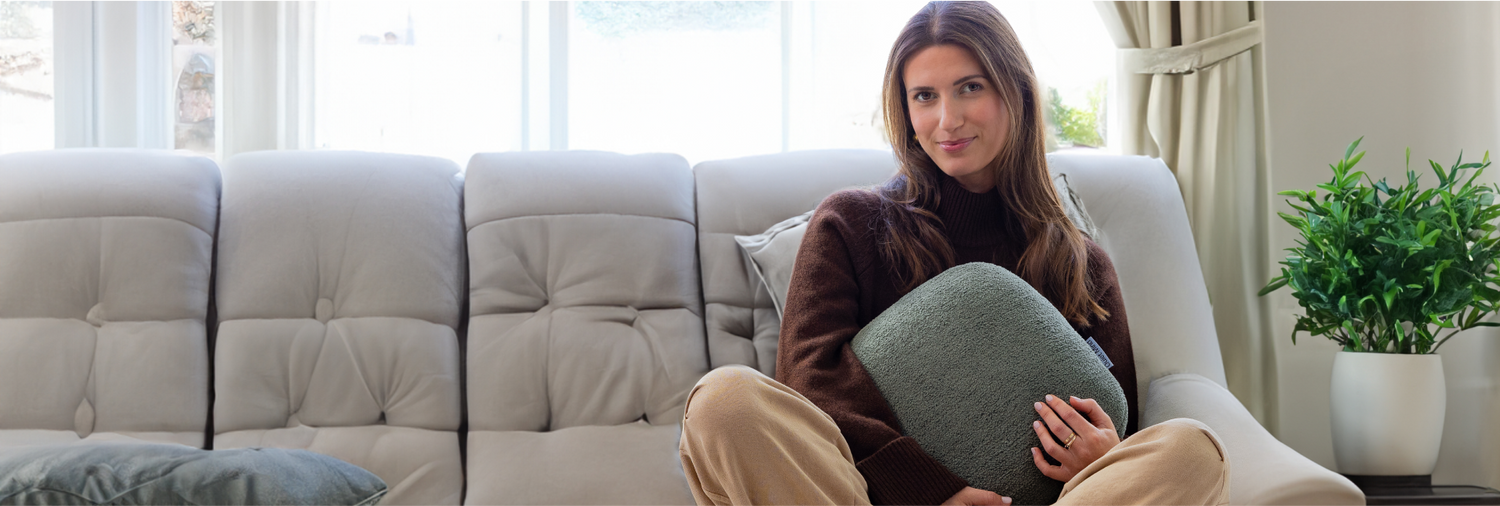There’s a quiet comfort in the weight of a blanket that feels just right. For some, 12 pounds can be the sweet spot, offering a sense of grounding and ease. For others, it may feel overwhelming. The way a blanket’s weight interacts with your body, sleep style, and nervous system can shape whether it feels supportive or too much.
Your comfort might also shift with the seasons, your health, or even the kind of day you’ve had. A heavier blanket can feel soothing after a stressful day, while on warmer nights you might prefer something lighter. The ideal weighted blanket weight is personal, but knowing how to assess it will help you make a confident decision.
This article explores whether a 12 lb weighted blanket is too heavy for you, or just right, while also considering factors like blanket size, weight distribution, and your body weight range.
How Heavy Should a Weighted Blanket Be?
There’s no single “right” weight, only the one that helps you feel calm, safe, and supported. Most guidance starts with a percentage, and that percentage can be used as a reference in a weighted blanket weight chart. If you want a weighted blanket that enhances your comfort, choosing the right weight is the first step.
Understanding the 10% Rule
A common starting point is to select a blanket that’s approximately 10% of your body weight. This provides enough deep pressure stimulation (DPS); also referred to as deep pressure therapy, without overwhelming the nervous system. Weighted blankets can provide this calming sensation through evenly distributed weight across your body.
|
Body Weight (lbs) |
Recommended Blanket (lbs) |
|
100–120 |
10–12 |
|
121–150 |
12–15 |
|
151–180 |
15–18 |
|
181–200+ |
18–20+ |
This rule offers a helpful benchmark, not a prescription. A blanket should be about 10 percent of your body weight, but personal preference plays a role, especially if you’re considering heavier blanket options such as 20 lbs, 30 pounds, or even 35 pounds for larger body frames.
In a 2025 field study, Bremer and others observed significant improvements in sleep quality, restfulness, and reduced night waking when participants used blankets at approximately 10% of their body weight.
Tip: If 12 lbs feels too much at night, try using a weighted pillow for sleep. It delivers targeted pressure on the chest or lap without the intensity of a full-body blanket.
Making Room for Personal Preference
Some people prefer light weighted blankets for mobility or heat regulation, while others seek a heavier blanket for a deeper sense of stillness. If you’re highly sensitive or prone to restlessness, trust how your body responds, comfort is the true measure.
Weighted blankets come in a variety of sizes, from twin-sized to king-sized, and choosing the right weighted blanket size can also influence how heavy it feels. For example, a king size hush blanket might feel heavier due to its larger blanket size, even if the blanket weight is the same.
Who Is a 12 lb Weighted Blanket Best For?
A 12 lb blanket is often a versatile middle ground, offering ample pressure without overwhelming most adult bodies. It’s considered by many sleep foundation experts as a balanced option on the weighted blanket weight chart.
Suitable for Adults and Larger Teens
A 12 lb weighted blanket tends to suit:
-
Adults who weigh roughly 110–140 lbs.
-
Petite sleepers who enjoy moderate pressure.
-
Larger teens seek the benefits of deep pressure without excess weight.
When using a weighted blanket, remember that the blanket size and weight distribution matter. Even if the overall weighted blanket weight is 12 lbs, a twin-sized throw blanket may feel more intense than a king-sized blanket of the same weight because the weight is more concentrated.
Considerations Beyond Weight
-
Height and body composition: Taller individuals may prefer heavier options for full-body coverage. The ideal blanket size ensures weight is evenly distributed.
-
Sleep position: Side sleepers may need less pressure on joints; back sleepers often tolerate more.
-
Medical conditions: Conditions like ADHD, anxiety, insomnia, or sleep apnea may benefit from deeper pressure, while those with chronic joint pain or certain respiratory issues should talk to a doctor before using a weighted blanket.
When a 12 lb Weighted Blanket Might Be Too Heavy
Even a well-intentioned weight can become burdensome. If your body is resisting instead of relaxing, if you feel restricted, overheated, or short of breath, this is your body’s way of telling you the blanket is not a good fit.
In some cases, it may mean you can’t use a weighted blanket safely at all, especially if the weight interferes with your ability to move, rest, or breathe comfortably.
Signs It May Be Too Much
-
You feel trapped, restricted, or overheated.
-
Movement feels effortful or uncomfortable.
-
Muscles or joints ache after use.
-
Sleep is disrupted, not improved.
Specific Health Considerations
|
Health Concern |
Risk |
Recommendation |
|
Joint or muscle pain |
Increased discomfort |
Try a lighter option |
|
Breathing issues |
Potential respiratory restriction |
Consult your healthcare provider |
|
Limited mobility |
Difficulty adjusting at night |
Use lighter weighted alternatives |
If you have sleep apnea, respiratory issues, or chronic joint pain, a full-size blanket may not be the safest choice. In these cases, weighted pillows can provide calming input without restricting movement.
When a 12 lb Weighted Blanket Might Be Just Right
For many, 12 pounds provides enough pressure to calm the nervous system without creating strain. It can offer a sense of stillness and relief at the end of a long day, acting as the perfect weighted blanket for moderate body weight ranges.
Benefits of Deep Pressure for Mental Health
Deep pressure therapy may:
-
Reduce cortisol (stress hormone).
-
Support serotonin and dopamine release.
-
Improve focus in ADHD.
-
Ease anxiety and overthinking.
-
Support deeper, more restorative sleep
|
Condition |
Potential Benefit |
|
Anxiety |
Nervous system regulation |
|
ADHD |
Calming overstimulation, improved focus |
|
Stress |
Lower cortisol, increased relaxation |
Research supports these benefits. A 2024 clinical trial found weighted blankets improved sleep and reduced anxiety, while a Swedish study showed blankets at ~12% of body weight boosted melatonin by nearly 30%, enhancing relaxation and sleep quality.
Best For Petite Adults or Larger Children
For smaller-framed adults or children over 100 pounds, a 12 lb blanket often lands in that “just right” zone, substantial enough to feel grounding, yet light enough for easy movement. In fact, for someone around 100 pounds, this weight aligns closely with what’s often recommended for deep pressure comfort, offering a steady, calming presence without becoming restrictive.
This weight range works especially well for petite adults who want steady pressure without sacrificing mobility, and for larger children who are ready for more substantial sensory input but not the intensity of the heaviest blankets.
It’s a practical middle ground; substantial enough to support relaxation and sleep, yet light enough to move under and adjust during the night. Blankets in this category can be an excellent starting point for those exploring the benefits of weighted blankets for the first time.
How to Test if 12 Pounds Is the Right Fit
Weighted blankets aren’t one-size-fits-all. The best way to know is to feel.
Trial Periods and Return Policies
Many brands offer trial periods ranging from 14 to 60 nights, which is especially helpful when buying a weighted blanket online.
Before purchasing, check:
-
Return shipping costs: heavier blankets like 20 lbs, 30 pounds, or 35 pounds can be costly to send back.
-
Refund or exchange options: in case you need a different weighted blanket weight or right weighted blanket size.
-
Trial window: enough nights to test for comfort, sleep quality, and overall sleep health.
A clear return policy makes it easier to choose a weighted blanket confidently, whether it’s a hush blanket, a throw blanket, or one of the best weighted blankets in a king size.
Start with Short Sessions
Begin with 10–15 minute rests during the day to notice how your body responds. Pay attention to:
-
Breathing ease
-
Joint comfort
-
Even weight distribution
If you feel soothed and supported, extend to full nights. If you feel restricted, consider a lighter weight or a blanket size that spreads the weight more evenly.
Remember: you do not have to commit to full-body coverage right away. A weighted pillow on your chest, lap, or shoulders can be a safer way to test deep pressure before investing in a full blanket.
Compare: 10 lb vs 12 lb vs 15 lb Weighted Blankets
|
Weight |
Best For |
|
10 lb |
Petite frames, lighter touch |
|
12 lb |
Moderate pressure, versatile option |
|
15 lb |
Deep pressure for those 150+ lbs or desiring more grounding |
The ideal weighted blanket weight depends on body weight range, sleep position, and comfort preferences. A blanket that provides enough pressure without feeling like a blanket that is too heavy will better support long-term use.
What to Do if Your Blanket Feels Too Heavy
Even a well-chosen blanket can feel overwhelming at first. Adjusting your approach can help.
Tips for Comfortable Use
Small adjustments can make a noticeable difference in comfort, especially if your blanket weight is on the heavier side or you’ve chosen a larger blanket size like king-sized or twin-sized.
|
Technique |
Description |
Benefit |
|
Layering |
Place a lighter blanket between you and the weight |
Softens intensity and improves temperature control |
|
Partial Cover |
Drape over legs or torso only |
Reduces pressure where needed |
|
Redistribution |
Shift or fold to localize weight |
Customizes sensation |
Even the best weighted blankets may require a break-in period. If you’ve bought a weighted blanket that feels like a blanket that is too heavy, these strategies can help it feel more manageable.
For individuals with certain medical conditions or sleep apnea, targeted use, like partial covering, can also help maintain safety and sleep health.
Try Weighted Throws or Pillows
For many people, smaller weighted options are more practical, travel-friendly, and versatile than a full-size heavy weighted blanket.
Quiet Mind offers focused alternative weighted pillows that deliver the benefits of evenly distributed deep pressure therapy without committing to a full-body blanket. These can be a perfect weighted blanket alternative for those who want a weighted blanket experience without the full weight.
|
Product |
Use Case |
|
Weighted Throw |
Drape over legs or shoulders for reading |
|
Weighted Pillow |
Place on chest or lap to soothe restlessness |
These lighter options suit people in a lower body weight range or those who find a larger blanket size overwhelming. They also take up less space and are easier to clean than a king size or heaviest blanket model.
What Experts and Therapists Recommend
Weighted blankets are widely used in occupational therapy for their calming effect. But like any tool, they’re most effective when used with awareness.
Insights from Occupational Therapists
Therapists emphasize that the starting point for most people is finding the ideal weighted blanket weight based on body weight range and comfort preferences. This is often guided by the 10% rule but adapted to the individual. Here’s a guide to their common advice:
-
Begin with the 10% rule, but trust your body: A blanket should be about 10% of your body weight, but some may prefer a slightly lighter or heavier blanket depending on blanket size and weight distribution.
-
Use under supervision for children or those with mobility challenges: This helps prevent a blanket that is too heavy from restricting movement or causing discomfort.
-
Seek medical advice for chronic respiratory or cardiovascular issues: Always talk to a doctor before using a weighted blanket if you have medical conditions that could be affected by added pressure.
This aligns with a systematic review in the American Journal of Occupational Therapy, which found weighted blankets work best when weight and distribution are tailored to the individual, using the 10% rule only as a starting point.
Quiet Mind’s Recommendations for Safe Use
Following these guidelines helps ensure that even the best weighted blankets offer comfort without unnecessary risk. Whether you’re using a twin-sized 10 lb blanket, a 12 lb moderate-pressure option, or a heavier 20–30 lb model.
-
Never use a weighted blanket on infants: Their bodies are not developed enough to handle the weight safely.
-
Ensure you can move freely and remove it without assistance: This is especially important when using king-size or heavier blanket models.
-
Avoid overheating: Opt for breathable fabrics, keep weight evenly distributed, and monitor temperature to protect sleep health.
Weighted blankets are powerful tools, but they are not the only way to experience the benefits of deep pressure. For daytime calm, travel, or lighter use, we recommend Quiet Mind weighted pillows.
They can be placed across the chest, lap, or shoulders to provide targeted support without the bulk of a blanket. Many of our customers find pillows to be a more versatile, practical option for everyday regulation.
Why Weighted Pillows Deserve a Place in Your Routine
While weighted blankets are the traditional choice for deep pressure therapy, weighted pillows are becoming the preferred option for many people seeking calm, focus, and comfort throughout the day. They offer the same grounding benefits in a lighter, more adaptable form, making them easier to use beyond the bedroom.
Targeted Pressure, Anytime You Need It
Weighted pillows provide focused deep pressure stimulation without covering your whole body. You can rest one across your chest, lap, shoulders, or legs, giving you control over where the comfort is applied. This makes them perfect for moments when a full blanket would feel too hot, heavy, or restrictive.
Unlike a blanket that relies on even coverage, a pillow delivers customized support, helping reduce muscle tension, slow heart rate, and calm the nervous system exactly where your body needs it most.
Designed for Versatility and Comfort
A key advantage of weighted pillows is their flexibility. You can use them while reading, meditating, working at a desk, or simply taking a moment to reset. Their compact size means they’re easy to move, travel with, or use across seasons without worrying about heat buildup.
Weighted pillows also work well for those with sensory sensitivities, ADHD, or anxiety, since they allow users to regulate input gradually and comfortably. The moderate, controlled pressure can help maintain focus and promote relaxation in both home and work settings.
Expert-Endorsed for Everyday Regulation
Occupational therapists often recommend starting with smaller, more manageable forms of deep pressure before progressing to full-body options. Weighted pillows fit perfectly into this approach, providing a safe, low-barrier entry point for people exploring sensory or stress-relief tools.
Because they weigh only a few pounds, there’s no need to calculate body-weight ratios or worry about restricted movement. This makes them a practical choice for children, older adults, or anyone managing chronic pain or mobility challenges.
The Quiet Mind Approach to Weighted Pillows
Quiet Mind Weighted Pillows are designed to bring calm within reach, anytime, anywhere. Crafted with soft, breathable materials and filled with fine glass beads for smooth, even pressure, they offer therapeutic comfort without bulk or heat.
Final Thoughts
A 12 lb weighted blanket can be the perfect weighted blanket for some and a blanket that is too heavy for others, it all depends on your body weight range, blanket size, and comfort preferences.
The ideal weighted blanket weight isn’t about following a strict formula; it’s about finding a blanket that provides enough pressure to feel secure without restricting movement, affecting your breathing, or disturbing your sleep health.
Whether you’re considering a twin-sized 12 lb option, a king size hush blanket, or exploring heavier blanket weights like 20 lbs or 30 pounds, the goal is to choose a weighted blanket that works with your body, not against it. By testing different blanket sizes and weight distributions, you can discover the one that supports your nervous system, reduces stress, and helps you rest more deeply.
And if blankets seem like a rather expensive and daunting start, you can always try Quiet Mind’s weighted pillows. They’re a perfect starting point for the DPT wellness space, made with premium quality materials and your health in mind.
About Quiet Mind
At Quiet Mind, we believe that rest isn’t something you earn, it’s something your body is designed for when it feels safe, supported, and in balance. Our approach is rooted in sleep health, sensory regulation, and gentle tools that work with your nervous system.
We create resources and products that help you improve sleep quality, reduce anxiety, and find a sense of steady calm, whether you want a weighted blanket, a lighter throw blanket, or other grounding aids that fit your lifestyle.
One of our most loved tools is our weighted pillow, thoughtfully designed to deliver evenly distributed deep pressure therapy without the commitment of a full heavy weighted blanket. It’s perfect for placing on your chest, lap, or shoulders during moments of rest, reading, or relaxation.
Frequently Asked Questions
What is the ideal weight for a weighted blanket?
Start with roughly 10% of your body weight. Adjust carefully based on comfort, sleep quality, nighttime rest patterns, daily energy, and how your body consistently responds during both short and long sleep cycles.
Can a weighted blanket be too heavy?
Yes. Signs include overheating, restricted movement, or poor sleep quality. A blanket that feels too heavy may also increase restlessness, joint strain, or interfere with breathing patterns during restful sleep.
Who should avoid weighted blankets?
Those with breathing issues, joint pain, or reduced mobility should consult a medical professional before use. People with circulatory conditions, severe anxiety, or chronic health limitations may also require additional medical guidance first.
How do I know if a 12 lb blanket is right for me?
If you weigh around 110–140 lbs and enjoy moderate pressure, it may suit you. Trial use is the best way to know for sure, especially if sleep quality improves consistently.
What are the benefits of a weighted blanket?
They may support better sleep, reduce anxiety, and improve focus, especially for those with ADHD or sensory needs. Weighted blankets can also promote relaxation, reduce nighttime stress, and help regulate nervous system activity.
Can I use a weighted blanket with a memory foam mattress?
Yes. Just ensure it doesn’t compress the foam excessively or affect the mattress’s ability to contour. Over time, excess pressure can also impact airflow, comfort, and proper spinal alignment during nightly rest.
Are weighted blankets suitable for children?
For children over 100 lbs, yes, when used under adult supervision and chosen at the right weight. Always consult a pediatrician or occupational therapist to ensure the blanket is safe and appropriate.
How do I clean my weighted blanket?
Follow care instructions carefully. Many require spot cleaning or dry cleaning. Avoid over-washing, especially with glass beads or sand fillings, since too much water exposure can damage stitching and reduce overall durability.
